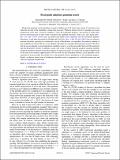Fixed-point adiabatic quantum search
Author(s)
Dalzell, Alexander M.; Yoder, Theodore James; Chuang, Isaac
DownloadPhysRevA.95.012311.pdf (428.7Kb)
PUBLISHER_POLICY
Publisher Policy
Article is made available in accordance with the publisher's policy and may be subject to US copyright law. Please refer to the publisher's site for terms of use.
Terms of use
Metadata
Show full item recordAbstract
Fixed-point quantum search algorithms succeed at finding one of M target items among N total items even when the run time of the algorithm is longer than necessary. While the famous Grover's algorithm can search quadratically faster than a classical computer, it lacks the fixed-point property—the fraction of target items must be known precisely to know when to terminate the algorithm. Recently, Yoder, Low, and Chuang [Phys. Rev. Lett. 113, 210501 (2014)] gave an optimal gate-model search algorithm with the fixed-point property. Previously, it had been discovered by Roland and Cerf [Phys. Rev. A 65, 042308 (2002)] that an adiabatic quantum algorithm, operating by continuously varying a Hamiltonian, can reproduce the quadratic speedup of gate-model Grover search. We ask, can an adiabatic algorithm also reproduce the fixed-point property? We show that the answer depends on what interpolation schedule is used, so as in the gate model, there are both fixed-point and non-fixed-point versions of adiabatic search, only some of which attain the quadratic quantum speedup. Guided by geometric intuition on the Bloch sphere, we rigorously justify our claims with an explicit upper bound on the error in the adiabatic approximation. We also show that the fixed-point adiabatic search algorithm can be simulated in the gate model with neither loss of the quadratic Grover speedup nor of the fixed-point property. Finally, we discuss natural uses of fixed-point algorithms such as preparation of a relatively prime state and oblivious amplitude amplification.
Date issued
2017-01Department
Massachusetts Institute of Technology. Department of Electrical Engineering and Computer Science; Massachusetts Institute of Technology. Department of PhysicsJournal
Physical Review A
Publisher
American Physical Society
Citation
Dalzell, Alexander M., Theodore J. Yoder, and Isaac L. Chuang. “Fixed-Point Adiabatic Quantum Search.” Physical Review A 95.1 (2017): n. pag. © 2017 American Physical Society
Version: Final published version
ISSN
1050-2947
1094-1622